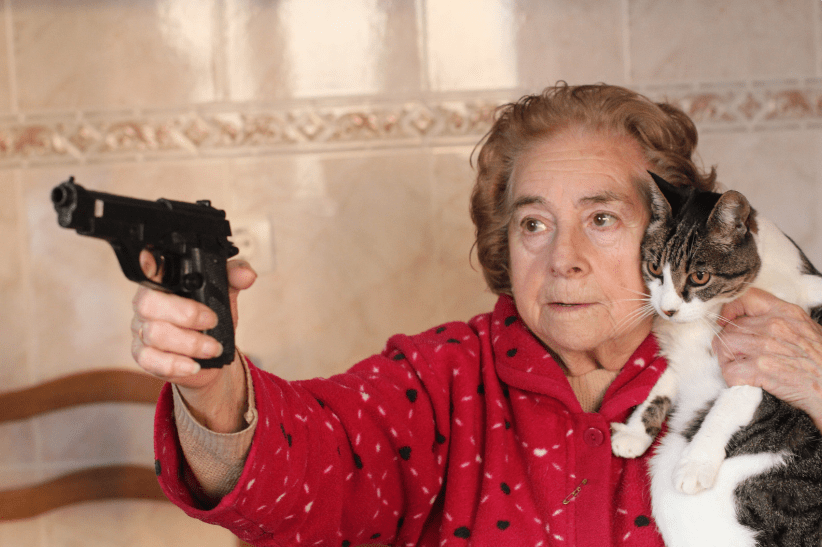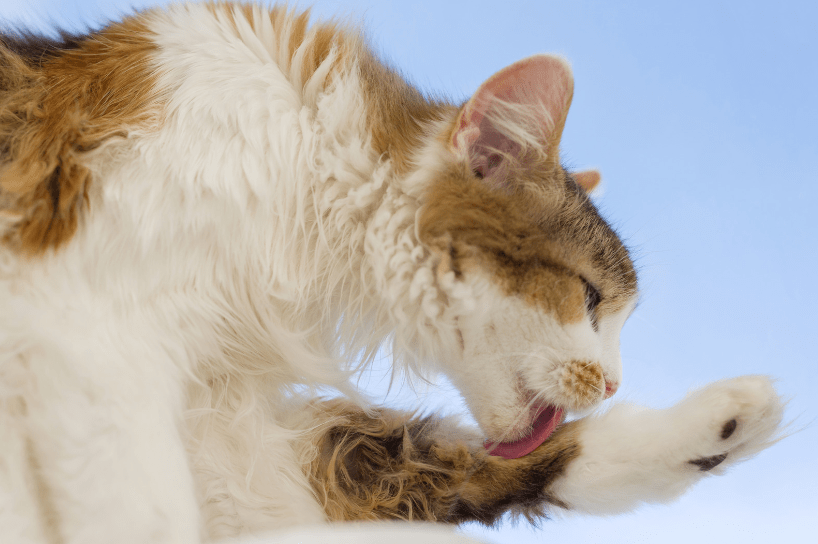Discuss how to talk to your cat about gun safety. Use simple terms and create a safe environment for this serious conversation.
Cats are known for their independent nature and sharp instincts, which means approaching the topic of gun safety must be done with both care and clear communication. As a responsible pet owner, it’s essential to ensure that your feline companion understands the dangers associated with firearms to prevent accidents in the home.
This discussion isn’t just about talking to your cat, but also about implementing practical measures that will keep both your pet and family safe. When broaching such an important subject, patience and attentiveness are crucial, and visual aids or demonstrations might help bridge the communication gap. Educate your cat on the risks and safety measures associated with firearms, thereby promoting a safer environment for everyone involved.
Introduction To Feline Safety And Communication
Talking to your cat might seem unusual, but it’s crucial for their well-being. Focusing on
feline safety and communication builds a deeper bond with your pet. It also ensures they understand dangers like firearms. Let’s explore how to approach these conversations effectively.
Understanding The Unique Communication Styles Of Cats
Cats possess their language. Observing body language, vocal cues, and behavior is key. Here’s a snapshot of what to look for:
- Tail flicking – Possible irritation or excitement
- Slow blinks – Signs of trust and contentment
- Purring – Can mean happiness or distress
Recognizing these signs lets you tailor safety discussions to their mood and attention level.
The Importance Of Discussing Safety Issues With Your Pet
Safety chats are not just about
preventing accidents. They ensure your pet respects boundaries and behaves responsibly. To introduce gun safety to your feline:
- Choose a quiet, distraction-free setting.
- Use simple words and a calm tone.
- Watch for their reaction and adjust your approach.
These steps foster an environment where learning and understanding thrive.

The Basics Of Gun Safety
Talking to your cat about gun safety begins with understanding the
fundamental principles of handling firearms. As bizarre as it might sound, this topic highlights the importance of
responsible gun ownership and the need to address the risks that come with having firearms in a home with pets. Below, we delve into the essentials of gun safety and how these precautions can benefit the well-being of your furry companion.
Principles Of Responsible Gun Ownership
Responsible gun ownership is crucial. Here are key points:
- Always Keep the Gun Unloaded when not in use.
- Secure the Firearm in a safe place, out of the reach of pets.
- Educate All Household Members on the dangers of firearms.
Addressing The Risks Of Firearms In A Home With Pets
Pets may not understand the dangers of firearms, leading to
unintended accidents.
| Risk Factor |
Safety Measure |
| Curious Pets |
Keep guns locked and inaccessible. |
| Handling Firearms |
Ensure pets are not present during maintenance or practice. |
Preparing For The Conversation
Are you ready to have “the talk” with your feline friend? Discussing gun safety is crucial, even with cats. Before diving into the nitty-gritty, preparation sets the stage for a receptive and calm conversation. Let’s ensure you’re ready to approach this important topic with care!
Creating A Comfortable Environment For Your Cat
To start the conversation right, comfort is key. Cats are sensitive to their surroundings, so pick a quiet, familiar spot.
Clear the space of any distractions. You may want to bring their favorite blanket or toy. A relaxed cat is more likely to listen.
- Choose a quiet room
- Avoid loud noises and interruptions
- Include comfort items like bedding or toys
Choosing The Right Time To Discuss Gun Safety
Timing is everything. Your cat’s mood matters. Aim for a moment after mealtime; cats are usually content then.
Observing your cat’s behavior before starting will clue you into their openness. Remember, a sleepy or playful cat might not be ready for serious topics.
- Wait until after meals
- Look for a calm, alert demeanor
- Avoid times when your cat is overly energetic or tired
Understanding Your Cat’s Perception
Talking to your cat about gun safety starts with understanding how they perceive the world. Cats view life differently than humans. Recognizing these differences is key to effective communication.
How Cats May Perceive Firearms Differently Than Humans
Cats rely on their senses to experience the world. Their
sharp hearing and sight are crucial. These senses might make them
sensitive to guns. Loud noises can scare cats. They might see guns as
threats.
- Cats hear higher frequencies.
- Loud bangs can cause fear or stress.
- A gun’s smell is unfamiliar and potentially alarming.
Guns carry
strong scents of oil and metal. Cats have a
keen sense of smell. This can overwhelm them. Guns have no natural place in a cat’s environment.
Observing Your Cat’s Behavior Around Guns
Pay close attention to your cat’s reactions to understand their feelings about guns. Note any
signs of distress such as
hiding or
aggression.
| Behavior |
What It Could Mean |
| Hiding |
Fear or seeking safety |
| Hissing |
Feeling threatened |
| Curiosity |
Interest, but caution is needed |
Keep guns out of reach and secure. Never assume your cat will ignore a firearm. Your pet’s safety is
always a priority.
- Lock firearms away securely.
- Never leave a gun unattended.
- Store ammunition separately.
Conveying The Message Effectively
Whether it’s gun safety or healthy boundaries, communicating with your cat can be quite the challenge. Yet, conveying the message effectively is crucial. Cats may not understand our words, but they’re experts at picking up non-verbal signals. Let’s explore how to use those cues and positive reinforcement to teach our feline friends about safety.
Using Non-verbal Cues To Communicate Safety
Non-verbal communication is a powerful tool in teaching your cat. Unlike humans, cats rely heavily on body language. Begin by creating a
safe environment. Ensure all guns are securely stored and cat-friendly zones are well-established. Use consistent
actions to signal danger or safety. For instance:
- Pointing to the safe area versus a no-go zone.
- Expressing a calm demeanor to show that an area is safe.
- Using barriers to block access to unsafe spaces.
The Role Of Positive Reinforcement In Feline Training
Positive reinforcement works wonders with cats. Reward your cat with
treats or affection after good behavior. This encourages them to repeat those actions. When teaching gun safety, applaud their
excellent decisions with immediate rewards. This could include:
- Giving a favorite treat when they avoid no-go zones.
- Provide a gentle pet or playtime when they come to you instead of exploring dangerous areas.
- Using a clicker for immediate positive sound association.
Remember, consistency is key. Repeat these exercises regularly to form
long-standing habits. Communicate effectively with your cat. Use these strategies for a harmony-filled, safe home.
Gun Storage And Accessibility
As a responsible pet owner and gun owner,
securing your firearms is paramount. Cats are curious creatures, known to climb and explore places we’d never imagine they could reach. The safety of your pets and family hinges on proper gun storage and accessibility. Let’s dive into practical ways to keep firearms out of your cat’s reach while maintaining a safe home environment.
Securing Firearms Away From Curious Paws
Curiosity can lead cats into dangerous situations.
Storing guns safely is a must. Here’s how:
- Use gun locks for an extra layer of safety.
- Consider high shelves or hidden compartments out of a cat’s leap range.
- Trigger locks prevent accidental discharges, keeping your cat safe.
Training your cat to
avoid certain areas can also contribute to gun safety. Positive reinforcement works best for cats.
Innovative Storage Solutions For Pet-friendly Homes
Modern gun storage options can blend seamlessly into your home:
| Type |
Features |
Benefits |
| Biometric Safes |
Fingerprint access |
Quick access for you, not for pets |
| Gun Cabinets |
Lockable, decorative |
Keeps guns out of sight and reach |
| Hidden Shelves |
Disguised as furniture |
Unsuspected by pets and guests |
Always select a storage solution that offers security and accessibility only to authorized users, never to curious paws.
Dealing With Accidents
Even the most careful cat owners can face unexpected situations. It is crucial to be prepared for accidents, especially if firearms are present in the home. This guide outlines immediate steps and training advice to ensure your cat’s safety.
Immediate Steps If A Pet Is Exposed To A Firearm
Act quickly and calmly if you discover your pet near a firearm. Your priority is to ensure no one gets hurt, including your furry friend.
- Clear the area – Remove your cat and other pets or people immediately.
- Secure the firearm – Unload the weapon if trained and safe to do so; otherwise, call for professional help.
- Contact your vet – If your cat has been injured, seek medical assistance right away.
- Assess the situation – After ensuring everyone’s safety, determine how your cat accessed the firearm.
Training Your Cat To Avoid Dangerous Areas
Preventing accidents is better than reacting to them.
Training your cat to stay away from certain areas can save lives.
- Set boundaries – Use barriers to block access to areas where firearms are stored.
- Use deterrents – Cats dislike certain smells and textures; apply these to areas around firearms.
- Positive reinforcement – Reward your cat when they avoid no-go zones, reinforcing good behavior.
- Consistency is key – Regularly train and remind your cat of the boundaries you’ve set.
Remember, keeping firearms locked and away from curious paws is the best way to prevent accidents. Train your cat, but also take the necessary precautions to secure any dangerous items.

Ongoing Conversations And Training
When it comes to ensuring your cat’s safety, the dialogue should never cease. Regularly engaging with your feline friend about gun safety is crucial. As with any training, consistency and persistence are key. Cats are curious and intelligent creatures, but they also require repeated reminders and progressive education as they grow and explore their environment.
Reinforcing Safety Messages Over Time
Like nurturing a plant, safety lessons need to be revisited often. Keep the following points in mind:
- Regular reminders help keep your cat’s safety knowledge fresh.
- Use positive reinforcement to encourage good behavior.
- Repeat key safety phrases in your daily interactions.
By making gun safety a routine part of your cat’s life, these lessons will stick. Cats enjoy a mixture of verbal cues and actions. For instance, show a toy gun and guide your cat away, reinforcing that such objects are off-limits.
Introducing New Safety Measures As Your Cat Ages
Honing safety habits never ends. Consider these tips as your cat matures:
- With age, introduce more complex safety tools and commands.
- Ensure your cat understands age-appropriate safety concepts.
- Adjust your approach to match your cat’s changing needs and abilities.
During their lifetime, cats may encounter different scenarios. A kitten needs basic guidance, while an older cat might require more nuanced instructions. Tailor your safety demonstrations to reflect these life stages, keeping engagement high and learning continuous.
Involving The Whole Household
Involving the Whole Household in conversations about pet safety and firearms is crucial. Cats are naturally curious creatures. They could stumble upon a firearm in the home. Ensuring everyone in the home understands the importance of gun safety is vital.
Educating Other Family Members On Pet Safety And Guns
It’s imperative to sit down with family members to discuss pet safety. Use a mix of discussion and visual aids to engage them. Make it clear that guns are not toys. Stress that they should always be stored securely.
- Lock away firearms in a safe or cabinet.
- Never leave guns unattended where a pet could reach them.
- Explain the risks of mishandling guns to kids.
- Set up ground rules for firearm access.
Consistency In Approach From All Household Members
Maintaining a consistent approach is key. Everyone in the family should follow the same safety steps. This way, your cat remains safe at all times.
| Family Member |
Responsibility |
| Parents |
Keep firearms locked and teach safety rules. |
| Children |
Understand rules and report any gun sightings. |
| Visitors |
Inform about pet and firearm safety policies. |
Consistent rules ensure
no mixed messages are sent to your cat. A united front is the best defense. Together, you create a secure environment for your furry friend.
Maintaining A Safe Environment
Creating a secure space for our feline friends is essential. We’ve explored ways to talk to cats about gun safety. A safe environment ensures they live without unnecessary risks. Let’s recap crucial lessons and reinforce the need for constant awareness.
Summarizing Key Takeaways In Feline Gun Safety
Cats are curious by nature. Keeping firearms out of their reach is vital. We’ve learned:
- Lock away guns securely. Cats can’t open locked drawers or safes.
- Educate family members about keeping firearms inaccessible.
- Remove ammunition and store it separately.
These steps can prevent accidents and keep our beloved pets safe.
Encouraging Ongoing Vigilance And Education
Protection is an ongoing effort. Cats need us to stay alert. Remember:
- Consistently check for potential hazards.
- Update safety measures as new information becomes available.
- Share what you learn with other cat owners.
Stay informed on
best practices for feline safety. Doing so can save lives.
Conclusion
Ensuring our feline friends understand the gravity of gun safety reflects responsible pet ownership. Speak to them with clarity, patience, and love. Remember, keeping cats informed contributes to a safer environment for everyone. Embrace the journey of educating your cat; peace of mind is the ultimate reward.






